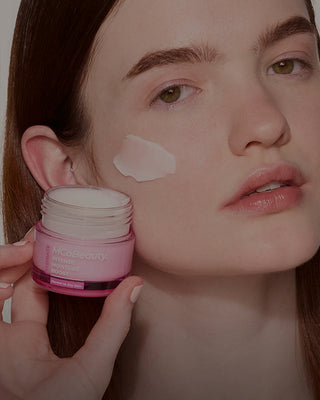
All About Your Skin Barrier
MCoBeauty Xtended|18 December 2024
All About Your Skin Barrier
Trends come and go but healthy, happy skin will always be in. The key to achieving that is maintaining a strong skin barrier. Read on to learn what your skin barrier is, what to do if it feels unbalanced, and how to simplify your skincare routine to look after your skin barrier.
What is the skin barrier?
Your skin barrier (sometimes called moisture barrier or lipid barrier) is part of the outermost layer of your skin, which is the stratum corneum. It’s your body’s first line of defence against the outside world, keeping harmful things away from your internal organs.
What is the skin barrier made from?
Your skin barrier is made from cells that form a ‘brick and mortar’ structure:
- The ‘bricks’ include compounds called natural moisturising factors (or NMFs for short). They attract and hold water to help keep your skin moisturised.
- The ‘mortar’ contains compounds including ceramides, cholesterol, and fatty acids. This helps the ‘bricks’ stick together and retain moisture.
Why is the skin barrier important?
When your skin barrier is functioning properly, the ‘bricks and mortar’ form a physical barrier that helps prevent unwanted things from getting in, and necessary things from getting out. Our skin isn’t a sponge; its main function is to block substances from getting into your body.
So, your skin barrier does a terrific job of keeping excess water out. The trickier part is making sure your skin holds onto enough moisture. If your skin barrier isn’t functioning properly, too much moisture may evaporate from your skin. This can lead to skin concerns like irritation due to skin dryness, dehydration, and sensitivity.
What can affect the skin barrier?
Over-cleansing. Over-exfoliating. Over-using harsh actives. Overdoing it in general. It doesn’t take much to upset your skin barrier’s delicate balance. The following factors, or a combination of them, could contribute to a weakened skin barrier:
- Environmental stressors (like wind, dry air, and sun exposure),
- Over-using skincare products like cleansers and exfoliants,
- Using the wrong products for your skin type,
- Not adequately moisturising your skin,
- Very hot showers or baths,
- Dehydration,
- Other health and lifestyle factors.
What are the signs of a compromised skin barrier?
When your skin barrier is in tip-top shape, your skin looks moisturised and feels smooth. Sure, you might experience some minor skin concerns here and there. But if it bounces back without you having to change your routine, it indicates that your skin barrier is in good condition.
However, if your skin barrier isn’t functioning as it should, it will let you know. These are some common signs of a weakened or compromised skin barrier:
- Looking dry, rough, flaky, or red,
- Feeling tight, stingy, itchy, or burning,
- Increased breakouts or excess oiliness,
- Increased flare-ups of other skin conditions,
- Sensitivity to gentle skincare products or water.
It can get to the point where no amount of moisturising seems to make a difference – or even a splash of water makes your skin feel uncomfortable. Does this sound like your skin right now? You might have a weakened skin barrier.
What can help improve skin barrier health?
First thing: don’t freak out. It might feel tempting to throw everything you have at your stressed-out skin, but that will likely make it worse. If you feel concerned, visit your healthcare professional before you do anything else.
Next, simplify your skincare routine and only use the basics: cleanser, moisturiser, and sunscreen. If your skin can’t tolerate a cleanser, gently wash it with cool water until you’re sure it can cope with cleansing again.
When it feels like your skin is returning to a more balanced state (this could take about a week), you can re-introduce cleansing, moisturising, and hydrating products. Slowly. Carefully. Gradually. At the first hint of irritation, return to your simple routine. It’s also wise to figure out what could be causing the issue and make necessary adjustments to avoid it in the future.
Which topical ingredients help support skin barrier health?
There are plenty of skincare ingredients that may help to boost your skin’s moisture content, re-strengthen your skin barrier, and keep it feeling healthy. Look for hydrating and moisturising ingredients like ceramides, cholesterol, fatty acids, glycerin, hyaluronic acid, niacinamide (vitamin B3), panthenol (vitamin B5), and tocopherol (vitamin E).
1. Mild cleanser:
2. Replenishing moisturiser
- Daily Moisture Boost, $39
- Intense Moisture Boost, $39
- Ultra Repair Ceramide Cream, $24
- Moisture Boost Overnight Mask, $32
3. Daily sunscreen
- Super Glow Invisible Face Mist SPF50+, $35
- Super Glow Invisible Face Serum SPF50, $23.40
-
Invisible Facial Sunscreen SPF50+, $35
References
R. Randall Wickett, and Marty O. Visscher, Structure and function of the epidermal barrier. American Journal of Infection Control Volume 34, Issue 10, Supplement, 2006, S98-S110
J. Rajkumar, N. Chandan, P. Lio, and V. Shi, The Skin Barrier and Moisturization: Function, Disruption, and Mechanisms of Repair, Skin Pharmacology and Physiology, 2023, 36:174–185
R.L. Bronaugh and H.I .Maibach, Percutaneous Absorption: Drugs – Cosmetics – Mechanisms – Methodology (3rd Edition). CRC Press: 28,1999.
This is not a substitute for professional healthcare advice. Nothing contained in this site is intended to be used as medical advice and it is not intended to be used to diagnose, treat, cure or prevent any disease, nor should it be used for therapeutic purposes or as a substitute for your own health professional's advice.
ALWAYS READ THE LABEL AND FOLLOW THE DIRECTIONS FOR USE.
Wear protective clothing, hats and eyewear when exposed to the sun. Avoid prolonged exposure in the sun. Reapply frequently to maintain protection.


